EU-tallekirjastojen tuoreita tuulahduksia Brysselistä | Hear the latest about European Documentation Centres from Brussels
(Please, scroll down to read in English.)
Aluksi
Reilun puolentoista päivän mittainen ”European Documentation Centres’ Training Seminar” pidettiin 16.–17. marraskuuta 2022 Brysselissä. Reippaasti yli satapäinen EU-tallekirjastojen edustajajoukko kokoontui tähän Euroopan komission Viestinnän pääosaston organisoimaan tapahtumaan, jonka viisi pääteemaa olivat akateemisten yhteisöjen osallistaminen, EU-tietokantakoulutukset, sosiaalinen media, vuoden 2024 europarlamenttivaalit ja työpajat EU-tallekirjastojen roolista. Koulutuspäivien ohjelma oli tiivis ja asiapitoinen. Tarkempi linkkilistaus koulutuspäivien materiaaleihin löytyy blogitekstin lopusta.
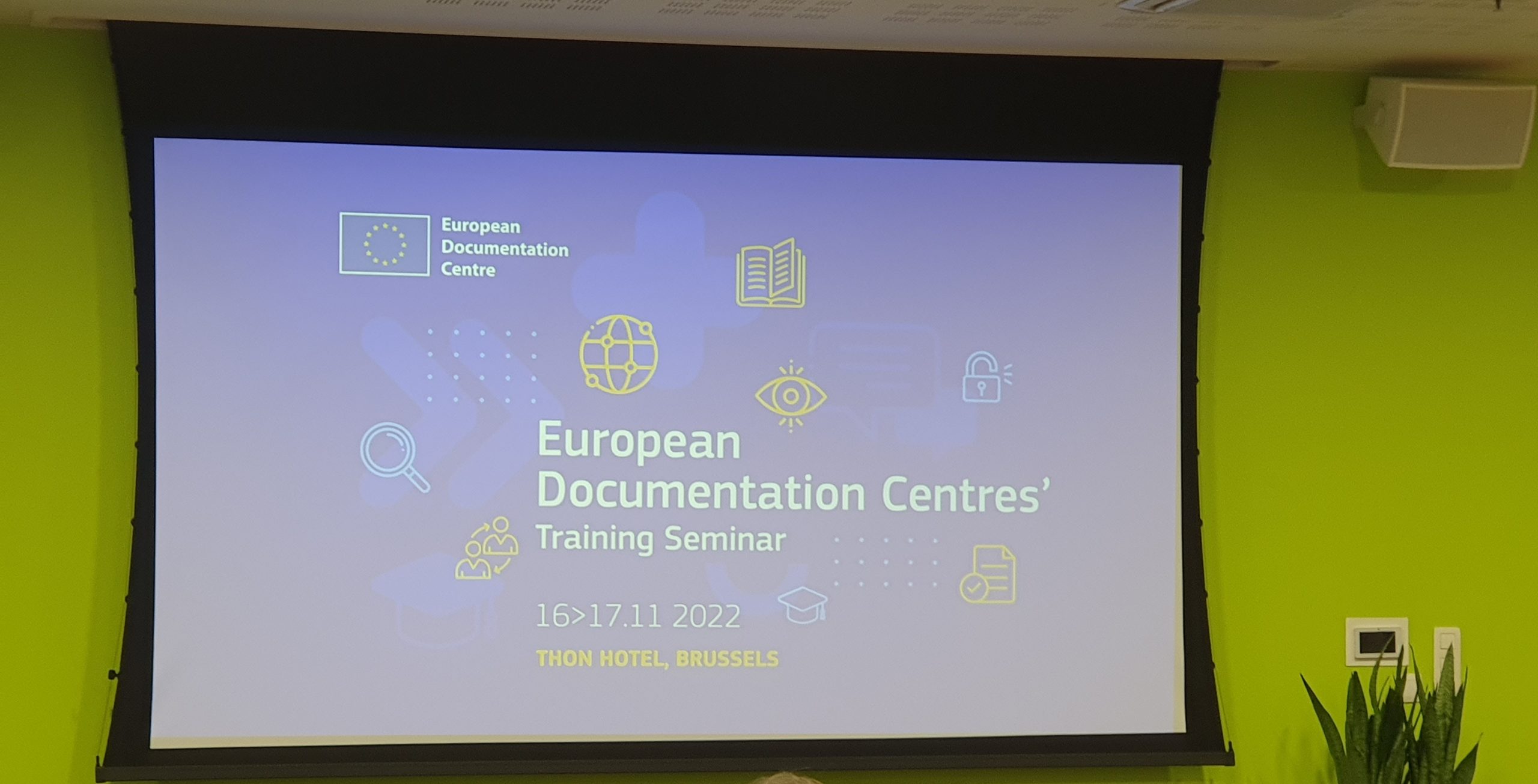
Ensimmäinen päivä
Jo ennen ensimmäisen puheenvuoron alkua yleisöstä oli aistittavissa avoin, innostunut, ja oppimisen janoinen ilmapiiri. Ehkä koronavuosien myötä yleistyneiden etäkokousten jälkeen kaikki olivat erityisen ilahtuneita tapaamaan vanhoja ja uusia kollegoita kasvotusten. Uutena EU-tallekirjastolaisena oli varsin helppoa ja luontevaa sujahtaa joukon jatkoksi verkostoitumaan ja kuuntelemaan mielenkiintoisia esityksiä.
Richard Kühnel (Euroopan komissiosta) kertoi avajaispuheessaan ensimmäisen EU-tallekirjaston perustamisvuoden olleen 1963. Veikkaan tiedon saaneen monen kuulijan pohtimaan kuinka tätä voidaan huomioida ja kenties juhlistaa omassa työyhteisössä ensi vuonna.
EU-tallekirjastojen roolia käsiteltiin monesta näkökulmasta koulutuspäivien aikana. Ensimmäisenä Gaetane Ricard-Nihoul ja Alessandro Giordani (molemmat Euroopan komissiosta) valottivat paneelikeskustelussa muun muassa EU-tallekirjastojen mahdollisuuksia osallistaa akateemista maailmaa mukaan aktiiviseen keskusteluun Euroopan tulevaisuudesta. Yhdeksi keinoksi mainittiin kansalaispaneelit, joita tullaan järjestämään tulevaisuudessa. EU-tallekirjastojen rooliteeman pohdiskelua jatkettiin neljässä rinnakkaisessa työpajassa. Jokainen osallistuja sai valita kaksi itselleen mieluista työpajaa.
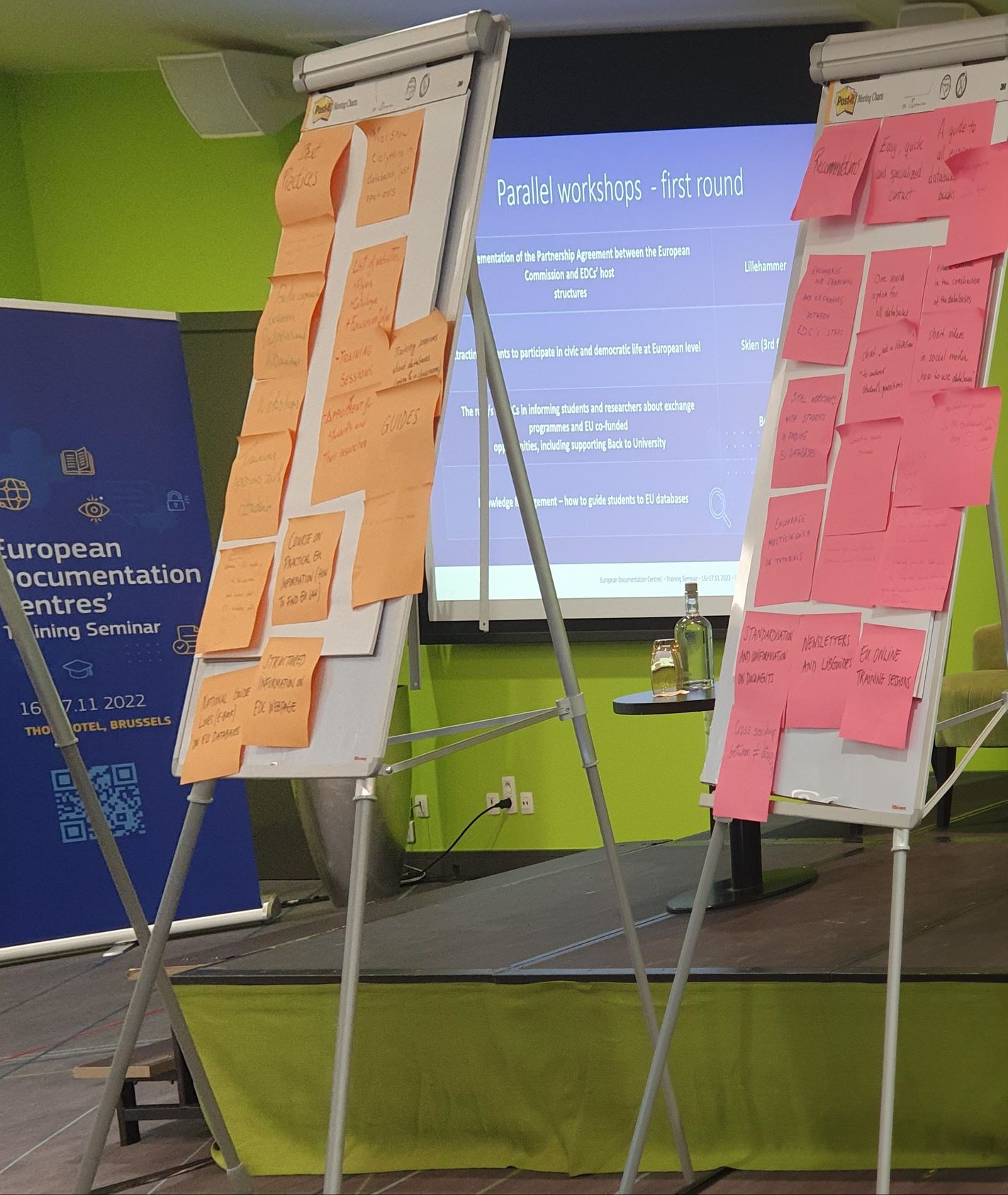
Osallistuin ensin työpajaan, jossa keskusteltiin keinoista saada opiskelijat ohjattua EU-tietokantojen ja -tietolähteiden äärelle. Toisessa työpajassa hahmoteltiin keinoja saada opiskelijoita osallistumaan muun muassa kansalaistoimintaan napakan johdantoesitelmän pohjalta. Nuorille suunnattua osallistavaa materiaalia on yllättävän paljon valmiiksi luotuna. Lopuksi rinnakkaisista työpajoista koottiin keskeisimmät huomiot ja oivallukset suurille Post it-lapuille seuraaviin kategorioihin luokiteltuina: haasteet, parhaat käytännöt ja suositukset. Koulutuspäivien päätteeksi työpajojen keskeisimmät oivallukset esiteltiin yhteisesti kaikille.
Neljässä tiiviissä ja käytännönläheisessä ”Search Like a Pro” -tietoiskussa tarjoiltiin tietoa neljästä EU-tietolähteestä:
- EUR-LEX
- EU Open Data Portal
- Legislative Observatory
- EC Library Guides
Jokainen “Search Like a Pro”-tietoisku alkoi lyhyellä tietoiskulla kulloisestakin tietolähteestä ja päättyi kysymys-vastaus-osioon, jossa yleisön kiperiin kysymyksiin vastailtiin syvällä asiantuntemukselle. Tietoiskujen suurin anti oli niiden konkreettiset tiedonhakuesimerkit.
Kolmessa lyhyessä hissipuheessa esiteltiin kolmea eri tietovarantoa:
- EU Academy
- Publications Office
- Learning Corner
Mielenkiintoisina nostoina näistä voi mainita Learning Corner -sivuston yllättävän laajat ja monipuoliset opetusmateriaalit, pelit ja esitysmateriaalit, jotka on jaoteltu ikäryhmittäin. Maininnan arvoisena tutustumiskohteena voi suositella myös EU Academyn aineistojen (muun muassa opetusvideoita sisältäviä) kursseja. Palvelun käyttäminen vaatii rekisteröitymisen. Euroopan unionin julkaisutoimiston sivusto pitää sisällään valtavasti aineistoa esimerkiksi eurooppalaisesta datasta, EU-julkaisuista sekä tutkimuksesta ja innovoinnista.
Ensimmäisen päivän ehtoopuolella Stephen Clarkin (Euroopan parlamentista) taidokkaasti koottua esitystä vuoden 2024 europarlamenttivaaleista oli ilo katsella ja kuunnella. Clarkin taito kiteyttää sanomansa kuvan ja parin ydinsanan avulla on taito, jonka toivon oppivani. Vaikka europarlamenttivaaleihin on yli vuosi aikaa, niihin valmistautuminen aloitetaan hyvissä ajoin Euroopan unionissa.
Ensimmäisen päivän viimeisessä esityksessä paneuduttiin tuhdilla tietopaketilla sosiaalisen median maailmaan. Esityksen valovoimaisin anti oli Belgian Antwerpenin EUROPE DIRECT -pisteen edustajien konkreettiset esimerkit heidän tavoistaan käyttää sosiaalista mediaa (Facebook, Instagram, LinkedIn ja Pinterest). Yleisöstä kyseltiin, miksi heillä ei ole Twitter-tiliä. Syynä oli muun muassa sen päivitystiheyden tarve. Kuulijoille tarjoiltiin myös tietoa sosiaalisen median käytön hyödyistä.
Ensimmäinen päivä päättyi cocktail-tilaisuuteen ja illalliseen.
Toinen päivä
Toinen koulutuspäivä alkoi Jeremy Herryn (Euroopan komissiosta) Euroopan vihreän kehityksen ohjelman esittelyllä. Sen tavoitteena on ilmastoneutraali Eurooppa vuoteen 2050 mennessä. Esityksessä annettiin EU-tallekirjastolaisille vinkkejä, kuinka ilmastosanomaa voidaan viedä eurooppalaisten tietoisuuteen. Valmiiden (englanninkielisten) tietovarantojen avulla, kuten Climate Pact ja Education for Climate Coalition, on helppo järjestää esimerkiksi keskustelutilaisuuksia ilmastonmuutoksesta.
Koulutuspäivien viimeisessä puheessa Alessandro Giordani antoi lähtijöille kotiinviemisiksi tehtäviä, jotka liittyvät muun muassa viestintään omassa työyhteisössä. Koulutuspäivät eivät jää irralliseksi tapahtumaksi, vaan kotitehtävät tuovat jatkuvuutta EU-tallekirjastojen toimintaan Euroopan unionissa. EU-tallekirjastojen toimintaverkoston laajuus hahmottuu parhaiten kurkkaamalla kartasta toimipisteet. Kartasta löytyy myös EU-tallekirjastolaisten yhteystiedot. Ota rohkeasti yhteyttä meihin!
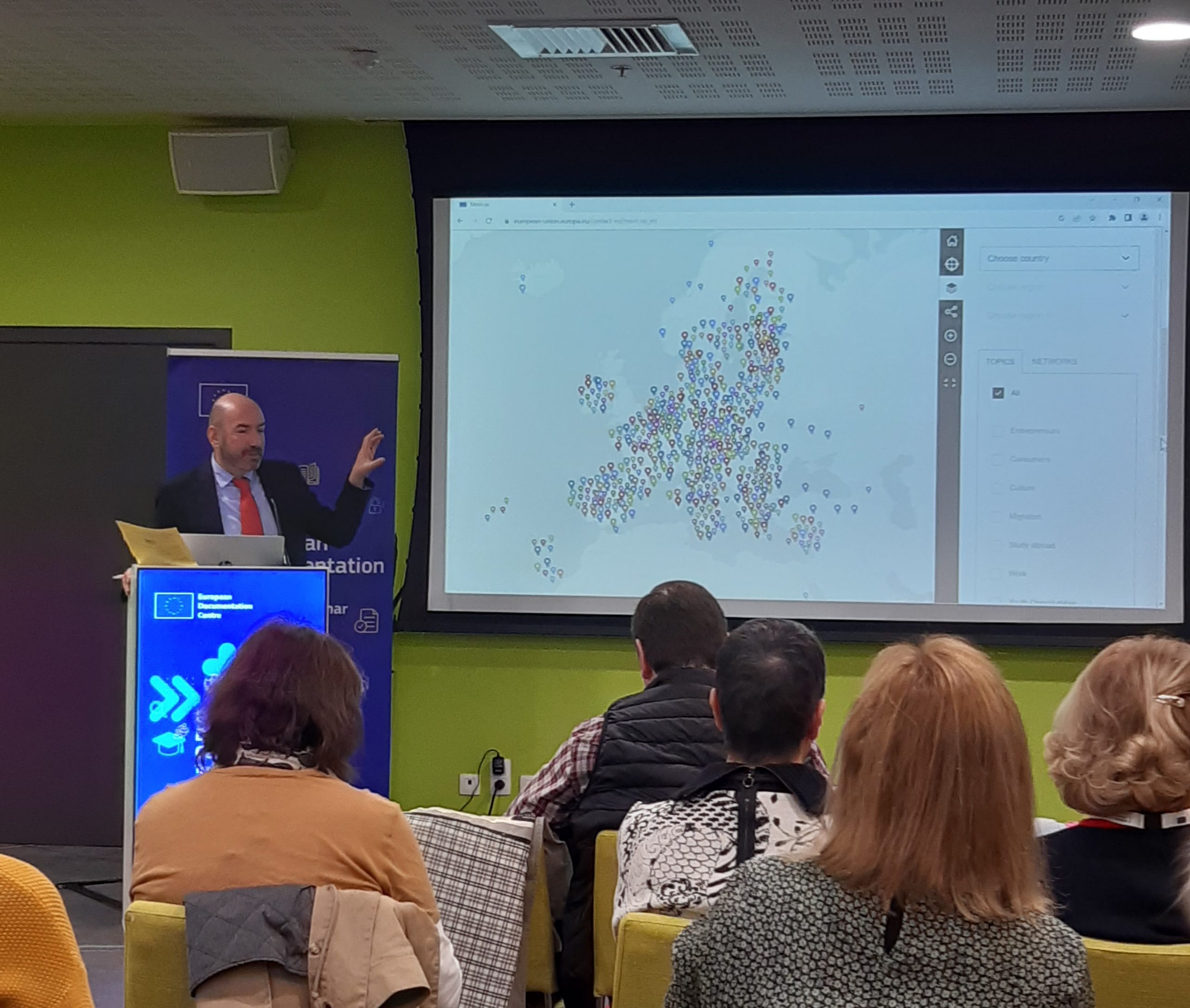
Toisen päivän päätteeksi jäi hieman aikaa pyörähtää Brysselin tunnelmallisessa keskustassa muun muassa Grand-Place-aukiolla. Tuliaisiksi valikoitui kaupoista suklaata ja karkkia, mutta pitsihankinnat jäävät seuraavalle kerralle.
Lopuksi
Koulutuspäivien tuhtiin sisältöön voi tutustua kätevästi vaikkapa nauhoitteiden tai esitysmateriaalien avulla (katso alta linkkilistaus). Toivottavasti vastaavanlaista koulutusta järjestetään tulevaisuudessa lähitapaamisformaatilla, vaikka etäkoulutuksilla on oma tärkeä paikkansa nykymaailmassa. Lähitapaamisissa innostava ilmapiiri on lähes käsinkosketeltavaa ja verkostoituminen kansainvälisestikin käy kädenkäänteessä kahvitauolla.
Linkit
Koulutuspäivien
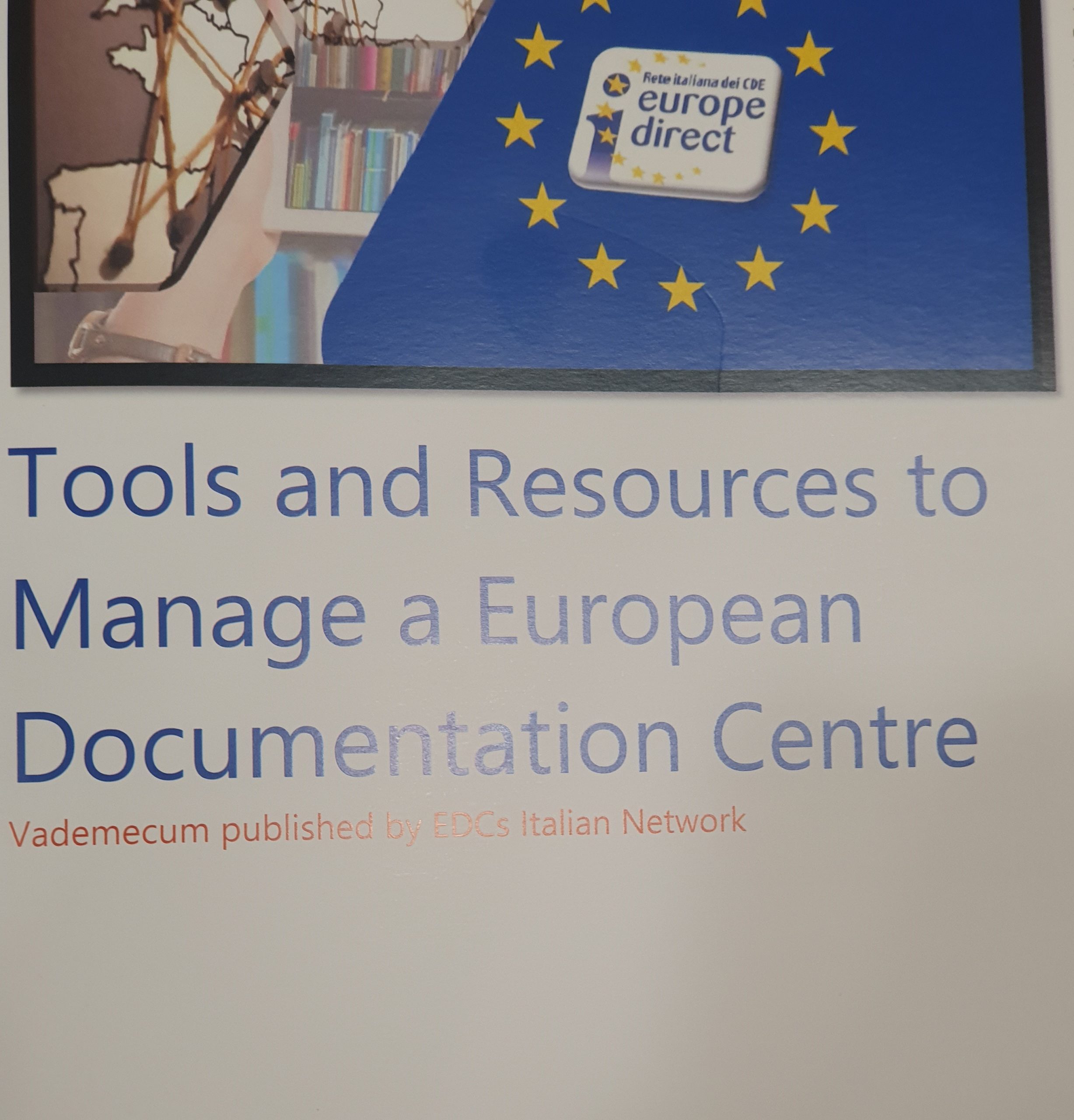
Introduction
The “European Documentation Centres’ Training Seminar”, lasting about a day and a half, was held in Brussels on 16–17 November 2022. This event, organised by the European Commission’s Directorate-General for Communication, brought together an audience of well over 100 representatives from most European Documentation Centres (EDC). The five main themes of the seminar were: engagement with the academic community, EU database training, social media, the European Elections 2024, and workshops on the role of EDCs. The programme of the training days was concise and informative. You can find a more detailed list of links to the materials of the training days at the end of the blog post.
Day one
Even before the first speech was held, one could sense that the audience was on an open and enthusiastic mood, and had a thirst for learning. Perhaps after remote meetings that became a commonplace during the COVID-19 years, everyone was particularly pleased to meet old and new colleagues face to face. As a new employee of the European Documentation Centre, it was fairly easy and natural to blend in with others, and network and listen to interesting presentations.
In his opening speech, Richard Kühnel (from the European Commission) said that the first European Documentation Centre was established in 1963. I bet that hearing this piece of information made many of the listeners consider how they could take this into account and perhaps celebrate it in their own work community next year.
The role of EDCs was discussed from many perspectives during the training days. First, Gaetane Ricard-Nihoul and Alessandro Giordani (both from the European Commission) shed light on the possibilities of EDCs, among others, to involve the academic community in an active debate on the future of Europe. One of the means mentioned was the European citizens’ panels, which will be organised in the future. The reflection on the theme concerning the role of EDCs continued in four parallel workshops. Each participant could choose two workshops of their preference.
I first took part in a workshop that discussed how to guide students to EU databases and sources of information. The second workshop outlined ways by which to attract students to participate in, for example, civic life with the help of compact introductory presentations. There is already a surprisingly large amount of ready-made participatory materials intended for young people available. Finally, the main observations made and insights found in the parallel workshops were collected on big Post-it notes and divided into the following categories: challenges, best practices and recommendations. At the end of the training days, the key insights of the workshops were shared with everyone.
Four concise and practical “Search Like a Pro” information spots provided knowledge on four sources of EU information:
- EUR-LEX
- EU Open Data Portal
- Legislative Observatory
- EC Library Guides
Each “Search Like a Pro” spot started with a short bulletin on the source of information in focus and ended with a Q & A session where experts with in-depth knowledge of the subject answered the tough questions from the audience. The biggest benefit the information spots gave me were the concrete examples of information searches.
Three short elevator pitches were held to present three different information resources:
- EU Academy
- Publications Office
- Learning Corner
As an interesting highlight of these, I could mention the surprisingly extensive and versatile educational materials, games and presentation materials on the Learning Corner website, divided by age group. Another resource I could recommend as worth exploring are the courses found in the EU Academy materials (including educational videos). Using the service requires registration. The website of the Publications Office of the EU contains a huge amount of material on European data, EU publications, research and innovation, etc.
Towards the end the first day, it was a pleasure to see and listen to Stephen Clark’s (from the European Parliament) skilfully compiled presentation of the European Elections 2024. Clark’s ability to crystallise his message with the help of an image and a few key words is the kind skill I hope to learn. Even though the European Parliament elections are still more than a year away, the European Union is starting to prepare for them well in advance.
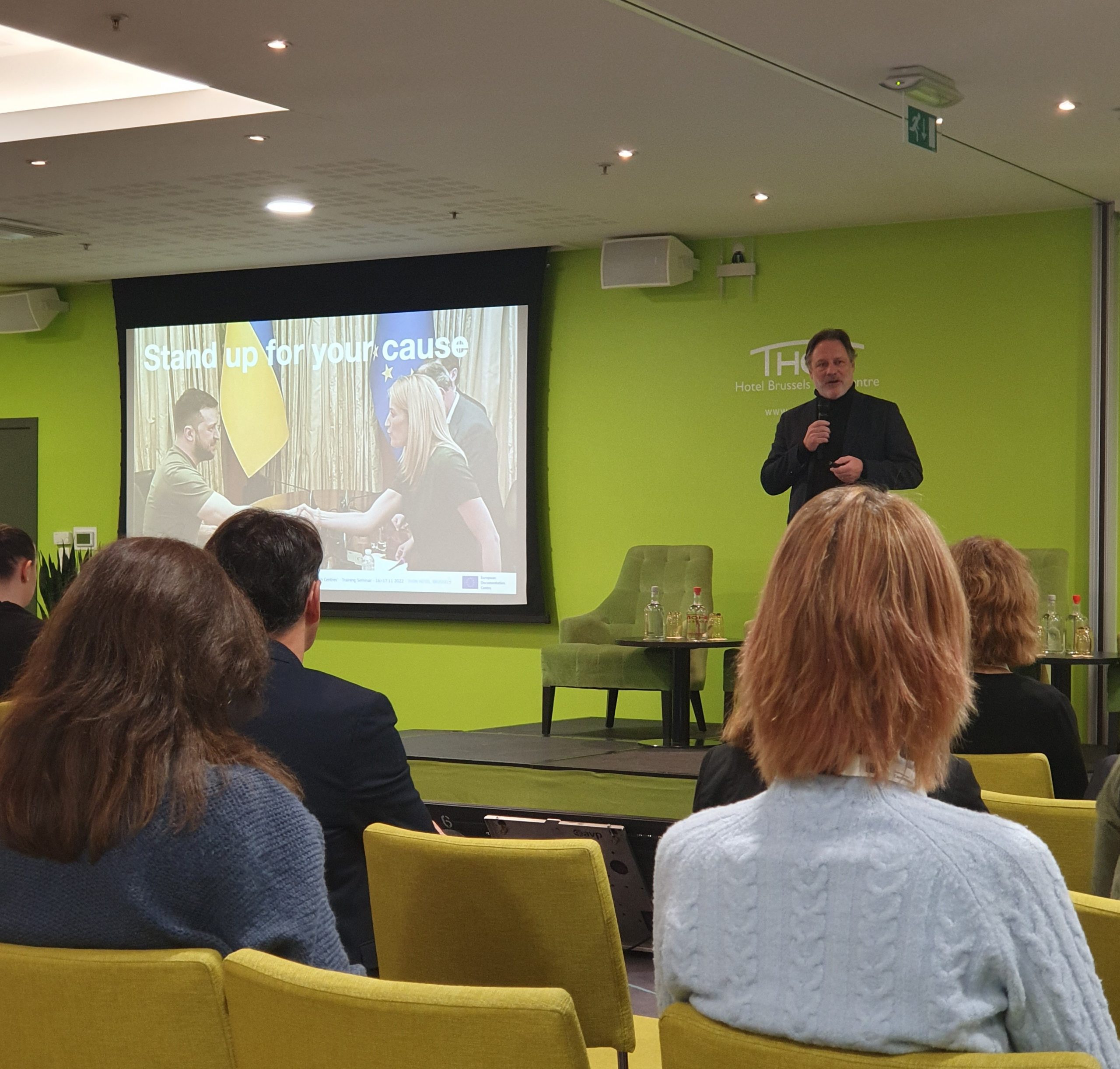
The last presentation of the first day focused on the world of social media in the form of a very generous information package. The most illuminative part of the presentation were the concrete examples given by the representatives of the EUROPE DIRECT service point in Antwerp, Belgium, of how they use social media (Facebook, Instagram, LinkedIn and Pinterest). The audience asked them why they do not have a Twitter account. One of the reasons was that it would need to be updated very frequently. The listeners were also informed about the benefits of using social media.
The first day ended with a cocktail reception and dinner.
Day two
The second day of training began with the presentation by Jeremy Herry (from the European Commission) on the European Green Deal, aimed at a climate-neutral Europe by 2050. The presentation gave tips to EDC employees on how they could bring the climate message to the attention of Europeans. Ready-made data resources (in English), such as Climate Pact and Education for Climate Coalition, make it easy to organise discussion events on climate change, for example.
In the last speech of the training days, Alessandro Giordani gave as homework for the delegates tasks related, among other things, to communications in their own work community. The training days will not remain a separate event, but the homework given brings continuity to the activities of EDCs within the European Union. The best way to fathom the scope of the operating network of EDCs is to take a look at the locations of the EDC service points on a map. You can also find the contact details of EDC employees on the map. Do not hesitate to contact us!
At the end of the second day, there was some time left to visit the atmospheric centre of Brussels, including the central square La Grand-Place. As my homecoming gifts from the local shops, I chose chocolate and candy – I’ll need to come back to buy the Brussels lace later.
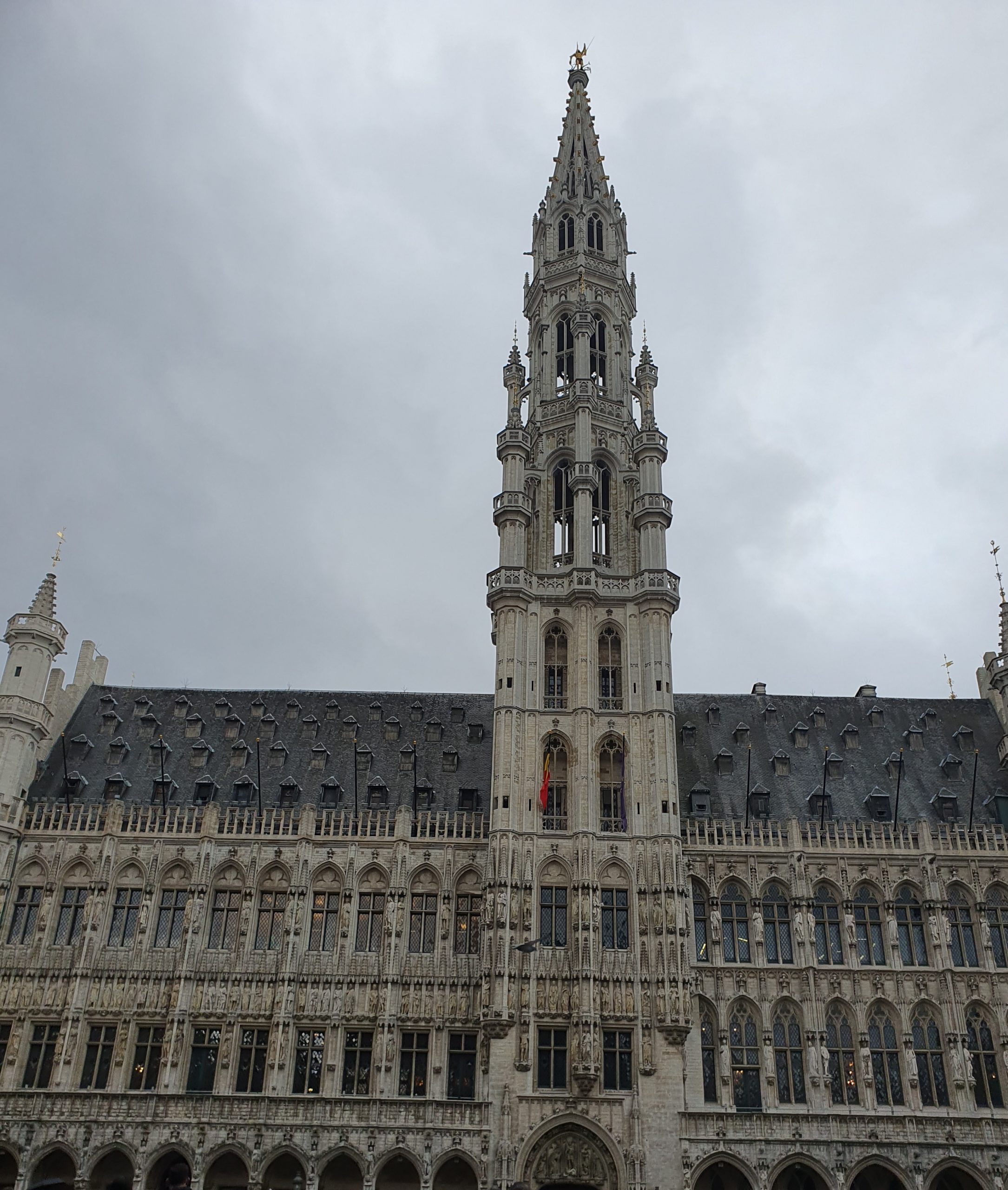
Conclusion
You can easily get acquainted with the generous content of the training days, for example, through recordings or presentation materials (see list of links below). Hopefully, similar training events will be arranged in the future in the form of face-to-face meetings, even though remote training also has its own important role in the modern world. When meeting in person, the atmosphere is so inspiring that you can almost touch it, and even international networking can happen in no time at all during a coffee break.
Links
Training days’
Marika Mahlavuori, tietoasiantuntija | information specialist
Opetus- ja tietopalvelut | Training and information services